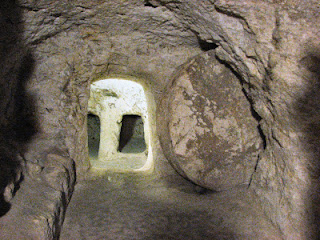"Before Abraham Comes to be (in the future), I am" John 8:58
Before Abraham Was (in the past), or Before Abraham Comes to Be (in the future)?
The key error in the deity of Christ understanding of John 8:58 is in translating Jesus’ statement about Abraham in the past when it refers to Abraham coming to be in the future. The Greek word γενέσθαι genesthai[1] in John 8:58 which is often translated in past tense -- “before Abraham was” (KJV, RSV, ESV) or “was born” (NAS, NIV) or “came into existence” (NET) -- can and as we will see, is better interpreted in a future sense. “Before Abraham comes to be, I am.” Note Young’s Literal Translation and the Literal Standard Version, which are more ambiguous, translate in the present tense:“before Abraham’s coming - I am”.
Video presentation for this teaching, click here.
The Greek word γενέσθαι genesthai occurs in this exact form seven times in the Gospel of John. In every occurrence, without exception, the word relates to something that will become or potentially comes to be at some point in the future. In John 8:58, “before Abraham comes to be, I am” would mean that before Abraham comes to be in the future, Jesus is (the Messiah, specifically here the light of the world). Before God's promises to Abraham are fulfilled – that Abraham would be the father of many nations, that Abraham’s seed would inherit the land, that Abraham would be the channel of blessing to all families of the earth, and before Abraham himself would come to be in the promised resurrection from the dead – before all that - the Messiah comes as the Light of the World. The Messiah Jesus IS the light of the world, before Abraham comes to be.
In other words, Jesus is making a Messianic claim to be the channel through whom God’s promises to Abraham will be fulfilled. Jesus’ claim is not a claim to be God, but to be the Messiah, the Light of the World through whom God is at work to fulfill God’s promises to Abraham.
Abraham is dead and buried in Hebron, yet to become, yet to experience the fulfillment of God’s promises to him, including resurrection from the dead.
 |
| Tombs of the Patriarchs, including Abraham, © Satellite Bible Atlas |
The seven occurrences of γενέσθαι genesthai in the Gospel of John are listed below. Note that in none of the other occurrences is genesthai translated in typical English Bibles in the past tense, which is strong evidence that likewise Jesus’s “I am” statement in John 8:58 about his relation to Abraham should NOT be understood or translated in the past tense:
1:12, “the right to become children of God”
3:9, “how can these things be/become”
5:6, “do you want to be/become healthy?”
8:58, “before Abraham becomes/comes to be, I am”
9:27, “Do you want to become his disciples?”
13:19, “I tell you this now, before it comes to be/happens”
14:29, “I have told you now before it comes to be/happens, so that when it happens you may believe.”
Other uses of γενέσθαι in Johannine letters and Revelation confirm that the word in this form (aorist infinitive middle voice) communicates the idea of a potential or future coming to be. There are not a lot of occurrences, but here are some examples:
2 John 1:12 Although I have much to write to you, I would rather not use paper and ink; instead I hope to come γενέσθαι to you and talk with you face to face, so that our joy may be complete.
Revelation 1:1 The revelation of Jesus Christ, which God gave him to show his servants what must soon take place γενέσθαι; he made it known by sending his angel to his servant John… (See the same usage in Revelation 1:19, 4:1, 22:6).[2]
Another interesting use of the same word is by Paul in Romans 4:18, since it specifically relates to Abraham:
Romans 4:18 Hoping against hope, he believed that he would become γενέσθαι "the father of many nations," according to what was said, "So numerous shall your descendants be."
To declare that Abraham hoped to become something and someone in the future, the apostle Paul used the exact same word (γενέσθαι) that the Gospel of John uses to describe the relationship of Jesus and Abraham.
Summary Points:
1) Translating the Greek word γενέσθαι genesthai in the past tense as “was born” or “was” in John 8:58 goes against all other occurrences of this exact same Greek word in the Gospel of John. In all other occurrences in John, γενέσθαι genesthai does not communicate something in the past tense but rather denotes someone or something that potentially could be or will be in the future. This is strong evidence that the word in John 8:58 relates to Abraham coming to be in a future context.
2) The closest grammatical parallel statement to John 8:58 is John 14:29 since in both statements the subject of the verb genesthai is preceded by the word “before” (πρὶν).[3]
John 14:29, “I have told you before it comes to be/happens” πρὶν (it) γενέσθαι
John 8:58, “before Abraham comes to be” πρὶν Abraham γενέσθαι
The word “before” in both John 8:58 and 14:29 makes it clear that Jesus statement in 8:58 is about Abraham coming to be in a future context. Jesus’s statement does not relate to Jesus being present before Abraham was born in the past. Rather, Jesus “I am” statement relates to Jesus being present before Abraham comes to be in the future.
3) Trinitarian (all "deity-of-Christ") presuppositions concerning the literal pre-incarnate existence of Christ have negatively influenced the translation and interpretation of this verse, making it a claim about Jesus’s relationship to Abraham in the past, while it should be interpreted in connection to Jesus’s being the Light of the world Messiah before Abraham “comes to be” in the future. The end result of the Trinitarian interpretation is a deflection from the hope of the promises of God fulfilled in resurrection.
- - - - - - - -
Footnotes:
[1] Infinitive aorist middle from γίνομαι, capable of many translations, including “become, happen, take place, be born, be made.”
[2] Revelation 1:19 Now write what you have seen, what is, and what is to take place γενέσθαι after this.
Revelation 4:1 After this I looked, and there in heaven a door stood open! And the first voice, which I had heard speaking to me like a trumpet, said, "Come up here, and I will show you what must take place γενέσθαι after this."
Revelation 22:6 And he said to me, "These words are trustworthy and true, for the Lord, the God of the spirits of the prophets, has sent his angel to show his servants what must soon take place γενέσθαι".
[3] John 13:19 is of similar grammatical construction and relates to something that will yet be in the future, using another Greek word for “before” πρό: "before it comes to be" πρὸ τοῦ γενέσθαι
[1] Infinitive aorist middle from γίνομαι, capable of many translations, including “become, happen, take place, be born, be made.”
[2] Revelation 1:19 Now write what you have seen, what is, and what is to take place γενέσθαι after this.
Revelation 4:1 After this I looked, and there in heaven a door stood open! And the first voice, which I had heard speaking to me like a trumpet, said, "Come up here, and I will show you what must take place γενέσθαι after this."
Revelation 22:6 And he said to me, "These words are trustworthy and true, for the Lord, the God of the spirits of the prophets, has sent his angel to show his servants what must soon take place γενέσθαι".
[3] John 13:19 is of similar grammatical construction and relates to something that will yet be in the future, using another Greek word for “before” πρό: "before it comes to be" πρὸ τοῦ γενέσθαι


Comments
franchise Expo
franchise Expo Mumbai
franchise Expo Bangaluru
Trough Screw Conveyor delhi
Automatic Bag Slitting Machine
Micro feed screw delhi
Warehouse Storage rack
mezzanine floor
mobile compactor in delhi
fifo flow rack manufacturer
heavy duty rack delhi
Multi tier rack delhi
Slotted Angle rack delhii
Pallet rack manufacturer
Dust Collector
Franchise Opportunities
For centuries, Christians have mangled this verse of scripture producing the English phrase:
"Before Abraham was, I am."
A more grammatically sound English translation would be:
"I am he who is before Abraham.", ... or
"I am he who is before Abraham comes to be.", ... or
"I am he who is to come before Abraham."
Notice this word order for "I am." It should be at the beginning of the sentence when translated to English. If we keep translating it with, "I am" at the end we are playing into the old error of transliterating word order. The translators seem to keep that, "I am" clause independent on the end to perpetuate their entrenched nomina sacra mythos. We ought to toss the old word magic tricks into a fiery trash can.
No matter how translated, the gist of what Jesus says is that Jesus precedes Abraham NOW ... at the time he speaking the words ... and not at some past time. Your translation seems correct, although I think we are still missing some small sense of meaning of the original Greek, just as everyone else has for the past 500 years. I think I have an answer for that but it is too lengthy for a comment. Pray I can get to and finish it.